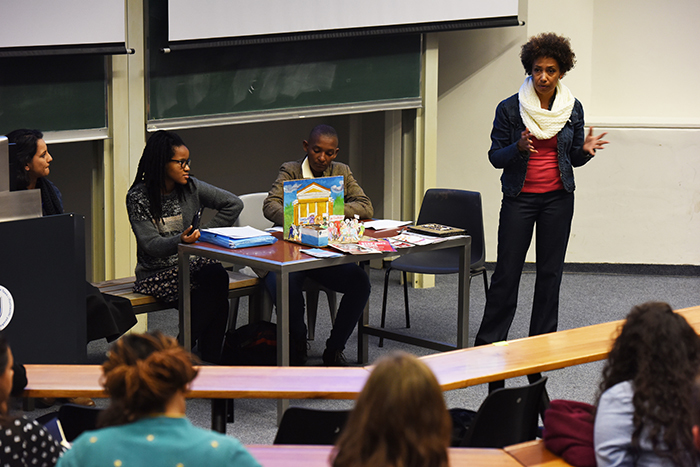Institutional response to sexual violence is disempowering to victims'
07 May 2016 | Story by Newsroom
UCT should take a public stance against all forms of discrimination and harassment; an LGBTQIA+ centre or women's centre should be established on campus; a specific gender policy is necessary; there should be regular campaigns to raise awareness about sexual violence on campus; and more panic buttons should be installed on commonly traversed routes around UCT's campuses.
These were some of the recommendations at a debate about the institutional response to sexual violence at UCT, which was organised by UCT's Black Academic Caucus (BAC).
UCT Survivors
“UCT Survivors, as an advocacy group, only exists because of the institutional silencing and delays in terms of response to sexual violence on this campus,” said Dela Gwala, representing UCT Survivors.
UCT Survivors was started by two people: one a rape survivor, and one a victim of sexual harassment on campus. Gwala stated that the rape survivor ended up leaving UCT because she grew tired of seeing her assailant roaming free on campus with UCT seemingly not recognising the trauma that she continued to face.
Some three years ago, one of Gwala's friends reported to UCT's Discrimination and Harassment Office (DISCHO) that she was being harassed by one of her lecturers, but her experience in seeking assistance was described as “one of the most disempowering of her life”. Even after she had reported him, he remained based just a few office doors from her. Gwala related many similar incidents, where survivors and victims were left with a sense that the institution was apathetic to their ordeals and to the incidents of sexual violence on campus.
“At a mass meeting, a UCT staff member stood up and spoke about her case, where she was stalked and harassed. This happened while she was a student. She came back to campus five years later to lecture, and she found out that the perpetrator was still on campus, despite her using the internal UCT processes and also taking her case to the courts to try to get a restraining order,” said Gwala.
Dr Zethu Matebeni, representing the BAC, made several recommendations for how the university could improve its response to sexual violence on campus.
The university needs to embark on regular campus-wide awareness-raising campaigns, Matebeni said; it needs to take a public stance against all forms of discrimination; a women's centre or LGBTQIA+ centre needs to be established; more panic buttons need to be installed along much-trodden pathways between campuses; there need to be more consistent security patrols in parking lots, especially at night; and there need to be more Jammie Shuttles to off-campus parking spots.
HAICU
Matebeni, Gwala's fellow panellist, was disappointed at UCT's “callousness” in announcing via email – “without inviting any consultation” – that DISCHO and the university's HIV/AIDS, Inclusivity and Change Unit (HAICU) would be merged. What made it worse, said Matebeni, was that the email, released with the report of a Council-ordered review of DISCHO, was not sent simultaneously with the release of the review of the Transformation Services Office, which took place in a similar time-frame.
Sianne Abrahams from HAICU explained how the unit uses an “infusion” approach to integrating issues of social justice, including combating sexual violence, into curricula.
“We like infusion because we're able to very succinctly embed any of these topics, at any time, into the existing course structure,” explained Abrahams.
“There's no extension of the course required; it responds directly to the course objective and requirements. There might be an addition in terms of assessment, and this is key. Are you going to be examined on the subject? Are you going to write an assignment about the content? It's important, otherwise it's not relevant to students. Why should they do it?”
One audience member remarked that by merging DISCHO – which came in for criticism at the forum – with HAICU, the university seemed to be abdicating its responsibility to improve DISCHO, making the unit HAICU's “problem” instead.
SART
The recently established Sexual Assault Response Team (SART) also came in for criticism. Members of the audience raised concerns about the fact that SART had been publicly announced before its terms of reference had been finalised, and were uncertain about whether it would indeed function as a response team or whether it would play a behind-the-scenes oversight role.
Associate Professor Sinegugu Duma, who chairs SART, admitted that the team did not have a dedicated office space or telephone line yet, and that she was only able to get to SART work at “2 o'clock in the morning” after her academic work had been seen to.
Story Yusuf Omar. Photo Michael Hammond.
 This work is licensed under a Creative Commons Attribution-NoDerivatives 4.0 International License.
This work is licensed under a Creative Commons Attribution-NoDerivatives 4.0 International License.
Please view the republishing articles page for more information.









